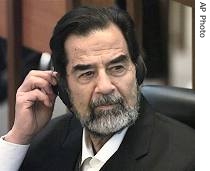2006年VOA标准英语-Saddam Hussein Genocide Trial Resumes(在线收听)
By Benjamin Sand
Irbil, Iraq
17 October 2006
 Saddam Hussein adjusts his headphones as he listens to witness testimony during his trial in Baghdad's heavily fortified Green Zone, October 17, 2006 |
||
---
Prosecutors say more than 180,000 people, mostly civilians, were killed during the so-called Anfal campaign.
On Tuesday a series of Kurdish witnesses described the alleged atrocities, including use of chemical weapons, widespread torture, and prison death camps. The witnesses told the court Iraqi soldiers rounded up thousands of Iraqi Kurds during the 1988 crackdown.
Seventy-eight-year-old Mutalib Mohammed Salman said he was taken to a prison in southern Iraq where scores of people including many of his own relatives died every day, either from disease, starvation or often brutal beatings from the Iraqi guards.
During a tense question and answer period afterward, Saddam Hussein sharply criticized the witnesses.
If this is true, he asked, why did the witness never look for his own family's bodies afterwards? Why cannot he identify the location of his wife's grave?
Saddam accused the witnesses of dividing Iraq and helping fuel the country's bitter internal struggles. The former dictator and his co-defendants face charges of crimes against humanity and could be executed if found guilty.
The case unfolds as Iraq continues to battle a sharp rise in deadly sectarian violence.
More than 20 people died Tuesday, the latest casualties during what is quickly becoming one of Iraq's bloodiest months in several years.
The worst fighting has occurred in the northern town of Balad. According to U.S. officials at least 60 people there have been killed in a series of sectarian revenge killings between the towns Suuni and Shiite Muslims. Earlier reports said nearly 100 people were killed.
U.S. troops joined Iraqi security forces to help contain the violence.
A U.S. military statement said coalition forces there have detained two Iraqi policemen allegedly involved in the killing of 19 Shiites on Friday. Those murders sparked the most recent fighting in hard hit town.